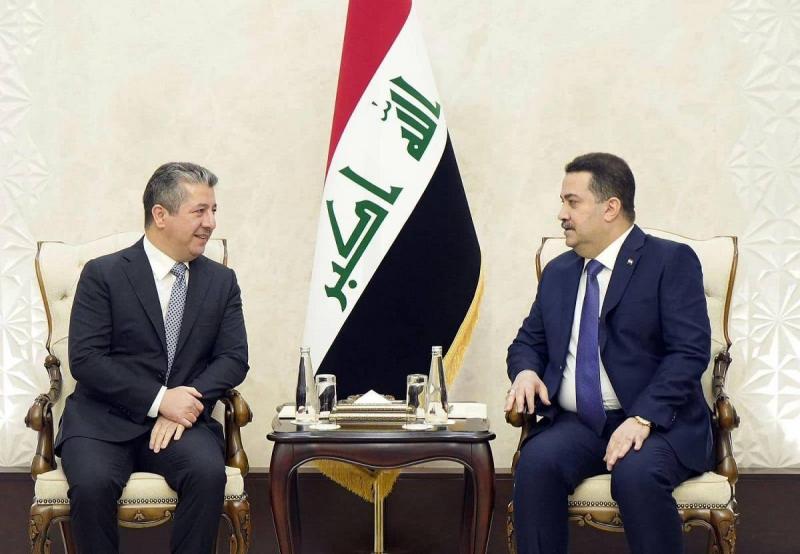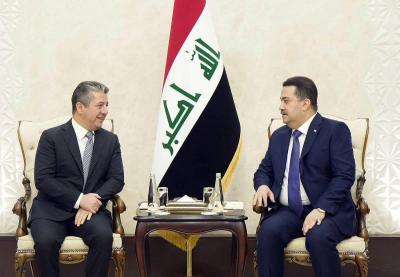Amid the wave of challenges surrounding the Kurdistan Region, the decisions made by Baghdad pose a realistic threat to the region's experience, which has long been considered the "bright side" in a turbulent Iraq plagued by security and political issues. Among the most impactful decisions are those by the Federal Court, which has been a contentious topic since its establishment in 2005, sparking debate from the interpretation of the Iraqi constitution to curtailing the powers of the Kurdistan Region.
Over the past years, the relationship between Baghdad and the Kurdistan Region has been marked by political ebb and flow, before more complex legal and constitutional complications emerged through what are described as "legal mines" by the Federal Court. The controversial rulings began with the court ruling that the oil and gas law ratified by the Kurdistan Parliament was unconstitutional, provoking a political crisis. This was followed by a decision that annulled certain parts of the electoral law in the region, leading to its postponement, and another ruling that required the federal government to pay salaries of the Kurdistan Region's employees directly, which displeased the regional government.
The court recently issued a decision canceling the quota system in the Kurdistan Parliament, which guarantees representation for religious and ethnic components, including Christians, Yazidis, and Turkmen. This decision faced widespread criticism from these groups, who felt it threatened their parliamentary representation. Some Kurdish politicians accused the Federal Court of interfering in the affairs of the region.
Observers believe that such decisions diminish the participation of religious and ethnic components in the political process within Kurdistan, which has been deemed a safe haven amid years of violence and conflict in Iraq. Experts assert that the Federal Court’s rulings escalate the dispute over the distribution of powers between Baghdad and Kurdistan, raising questions about the future and unity of Iraq. On one side, the Kurdistan Region demands adherence to the constitution, while some parties in Baghdad insist on "stripping" powers from Erbil.
They argue that unless Baghdad’s officials take steps to "ease the accumulated tensions," fears of widespread harm to Kurdish and Iraqi interests will persist. The recent ruling related to the salaries of Kurdish employees highlights an evident imbalance in how Baghdad's authorities address the region's issues and needs, which are not merely luxury concerns but impact the lives of hundreds of thousands of families, especially regarding the salary crisis that disrupts the livelihoods of millions without compelling justification.
From another perspective, observers find it unclear how some officials in Baghdad believe that the Kurdistan Region can continue to fulfill its constitutional duties toward its residents, while the "central state" is aware that oil revenue, accounting for about 80% of the annual budget for the Kurdistan government, has become a contentious issue controlled by Baghdad since Ankara halted the flow through the pipeline from the region to the port of Ceyhan in March 2023, and it has yet to be resumed amid lawsuits from the Iraqi government.
These ongoing decisions and crises lead to the belief that many practices and steps taken by Baghdad, especially in the Supreme Court and Parliament, where the influence of the Iran-aligned "Coordination Framework" parties prevails, serve a centralist agenda aimed at undermining the Kurdistan Region and its experience, including attempts to "dry up" its financial resources. This warning has indeed been voiced by the Kurdistan government spokesperson, Peshawa Hawrami, regarding government attempts to "starve the people of the Kurdistan Region" through cutting off their financial entitlements.
In this context, informed sources point to the "good intentions" of Prime Minister Sudanese in dealing with such issues with the leadership of the region and its government. However, they emphasize that goodwill alone will not stop the deterioration of trust between Baghdad and Erbil, especially since, despite being the Prime Minister, Sudanese lacks a strong political base to act independently amidst the varied pressures exerted by certain factions of the "Coordination Framework," some of which have armed military wings.
Observers cite the larger plan introduced by Mohamed Shia al-Sudani’s government over two years ago, which involves the "Development Road" project intended to connect the Gulf via Basra and up to the Turkish border, encompassing investments exceeding 17 billion dollars and expected to generate annual profits of about 4 billion dollars. However, the plans seem to deliberately exclude geographical areas belonging to the Kurdistan Region. Such steps are viewed by observers as efforts by certain influential political forces aligned with supporting the Prime Minister to marginalize the region from development projects and from potentially generating additional revenue, which has already become fragile, especially following the International Commercial Court in Paris ruling the illegality of oil exports from the region to Turkey, which has thus far squandered potential revenues estimated at more than 7 billion dollars, according to a prior statement from the Minister of Natural Resources in the Kurdistan Region, Kamal Muhammad Saleh.
It is widely believed that extending the "Development Road" through the region itself would activate the economy through direct investment in the railway and highways needed for the project. Furthermore, activating the road would facilitate the establishment of commercial and tourism projects along its length, which could substantially improve living conditions in the areas traversed by the project. Such development is expected at the state level, which ought to take care of it.
Concerns have risen—according to observers—that the repercussions of ongoing "political games and pressures" might impact Iraq's interests and the essence of its constitutional life and federal system. The situation is echoed in the recent actions of the Federal Supreme Court, where Judge Abdul Rahman Zebari resigned from the court in protest against recent rulings against the Kurdistan Region. He announced that he "sensed a tendency in the court's successive decisions to gradually revert to the foundations of a central governance system, distancing from the foundations and principles of the federal system through the expansion of exclusive powers for federal authorities."
Political sources informed Shafaq News that although the leadership of the region and the government in Erbil has shown cooperative spirit, the accumulated disputes have turned over the years into complex issues since they have not been addressed promptly, similarly to the issue of salaries for the hundreds of thousands of employees in the Kurdistan Region. The Erbil government claims that the federal government has not sent the necessary funds allocated in the regional budget while Baghdad claims that parliamentary changes to the budget have hindered the transfer of funds, insisting it provides the region with loans until the issue is resolved.
This may appear to some as a simple procedural issue, but it coincides with a halt to oil sales via the Ceyhan pipeline and an increase in attacks by deputies and figures from forces belonging to the "Coordination Framework," supportive of Sudanese, against any financial source for the regional authorities, including border crossings, taxes, and fees, as if the actual requirement is to suffocate the region financially.
Sudanese stated in a televised interview last January that "the final solution to end this file is to deal with employees in the region similarly to Iraqi state employees, receiving their salary regardless of these details we are discussing, but this requires amending the law in the Council of Ministers and sending it to the Parliament."
These complexities arise despite the Kurdistan government repeatedly confirming that it has fulfilled all its obligations toward Baghdad, including delivering oil revenues. A joint auditing team has been tasked with auditing all revenues, expenditures, and staffing in the region.
While Sudanese claims that "the budget law includes a clear provision for public spending, wherein we determine a 12.6% share for the region and provide it monthly funding, there is no clear provision in the budget law specifically for employee salaries," the Kurdistan government asserts that the federal government must "achieve justice" regarding salaries, emphasizing that employee and retiree salaries should not be linked to the resumption of oil from the region, given that the region handed this file over to the federal authority after the arbitration decision by the International Chamber of Commerce in Paris.
This situation persists despite an agreement reached between the regional authorities and the federal government outlining oil sales through the State Oil Marketing Organization “SOMO,” with revenues placed in a bank account managed by Erbil and overseen by Baghdad. However, a year after the cessation of exports to Turkey, operations have not resumed for several reasons, including the arbitration panel in Paris ordering Ankara to pay Baghdad approximately 1.5 billion dollars in damages resulting from oil exports from the region between 2014 and 2018.
**Solutions on the Horizon?**
Foreign Minister Fuad Hussein stated to Bloomberg that the government seeks to amend the federal budget to include import and transit fees for crude oil that will be exported to the port of Ceyhan (approximately half a million barrels per day), indicating that negotiations between Baghdad and global oil companies are ongoing in an attempt to reactivate the line after a year of its cessation. He noted that the main issue revolves around transport and recovery fees, with the actual cost being about $21 per barrel compared to the $6 set in the Iraqi budget.
There are potential solutions to resolve the oil disputes that have remained unsolved for 20 years. For instance, the American Washington Institute proposed addressing these oil disputes between Baghdad and Erbil by establishing an independent national energy company supported by the federal government that centers around the Kurdistan region and is headquartered there, similar to regional Iraqi oil companies or those operating in the provinces. It suggested that this company could also cover activities beyond oil and gas, potentially including flared gas exploitation and energy distribution, providing an opportunity for a profitable scenario for both Baghdad and Erbil together.
However, the political will in Baghdad is shrouded in ambiguity, caught between Sudanese's "good intentions" and the "agendas" of various political forces treating the region with equality and hostility, intensifying accusations against the region, sometimes linking it to Israeli intelligence and other times to US influence. Under such pretexts, the bombardment of Erbil becomes justifiable, and the hoped-for trust between Baghdad and Erbil is shaken. Meanwhile, the leadership of the region and its government warn of the dangers of deteriorating conditions, fears that were articulated by Kurdistan President Nechirvan Barzani during his recent visit to Baghdad, stating, "It is unacceptable to mix the lives and livelihoods of citizens with political problems and disputes, which have led people to live in poor living conditions due to their unresolved nature."
Additionally, there was a message from the Prime Minister of the region, Masrour Barzani, to President Joe Biden last year, as well as assessments from Foreign Policy magazine last August about the devastating effects of halted oil revenues on the region, which could lead to its collapse and possibly even civil war in Iraq.




